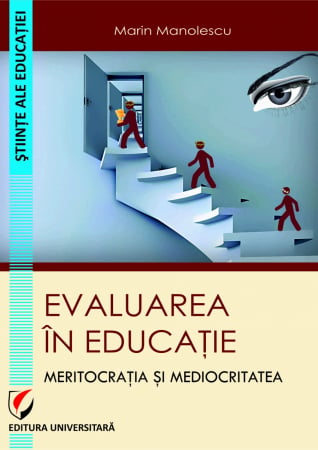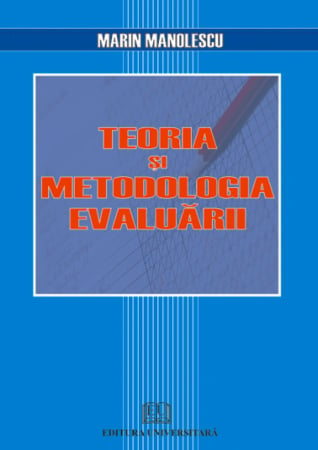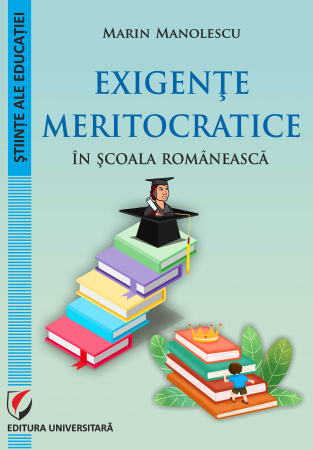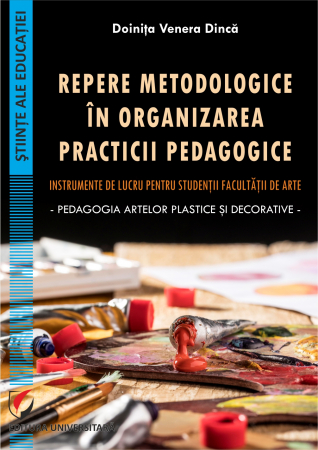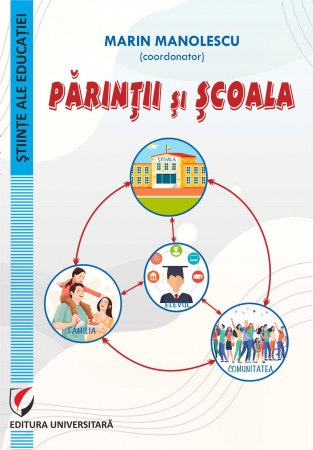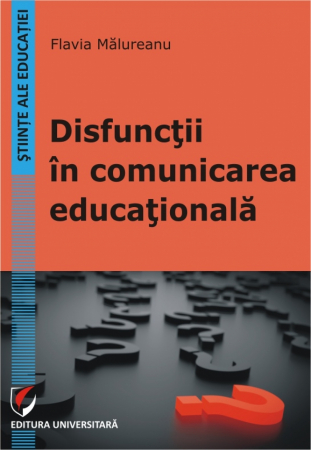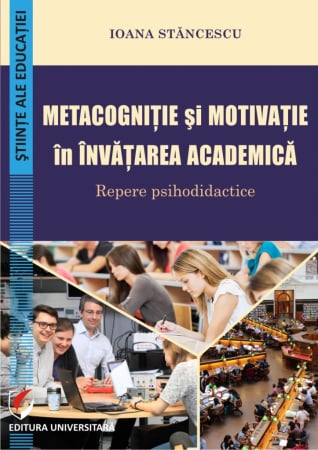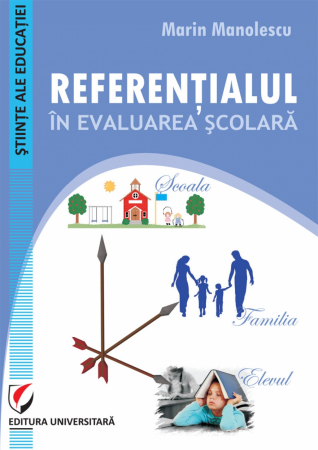Manuscript proposals: [email protected] / 0745 204 115 //// Tracking orders Individuals / Sales: 0745 200 357 / Orders Legal entities: 0721 722 783
6359.png) How to become the best teachers possible. Practical guide for teachers in pre-university and university education
How to become the best teachers possible. Practical guide for teachers in pre-university and university education
6359.png)
ISBN: 978-606-28-1361-1
DOI: https://doi.org/10.5682/9786062813611
Publisher year: 2021
Edition: I
Pages: 178
Publisher: Editura Universitară
Author: Andrei Dragulinescu
Product Code:
9786062813611
Do you need help?
0745 200 357
- Description
- Download (1)
- Authors
- Content
- More details
- Reviews (0)
This book addresses various topics, which complement each other in order to provide all teachers with concrete, practical methods, to continuously improve, both professionally and pedagogically, to overcome themselves, and to never lose focus. to become an essential factor in the development of pupils and students in all aspects.
-
How to become the best teachers possible. Practical guide for teachers in pre-university and university education
Download
ANDREI DRAGULINESCU, associate professor Dr. Eng.
Doctor of Engineering in Electronics (Polytechnic University of Bucharest, 2008);
Graduate of postdoctoral studies (Polytechnic University of Bucharest, 2013);
Research and improvement internships (Synchrotron Laboratories), Trieste, Italy;
Supélec (Ecole Supérieure d’Electricité) in Metz, France; TIMA Laboratorie (Techniques of Informatics and Microelectronics for the Architecture of Integrated Systems) in Grenoble, France; ORC (Optoelectronics Research Center) laboratories at the Technical University of Tampere, Finland;
Author of 25 books, as well as 23 scientific articles in specialized journals and volumes of internationally recognized scientific events.
Doctor of Engineering in Electronics (Polytechnic University of Bucharest, 2008);
Graduate of postdoctoral studies (Polytechnic University of Bucharest, 2013);
Research and improvement internships (Synchrotron Laboratories), Trieste, Italy;
Supélec (Ecole Supérieure d’Electricité) in Metz, France; TIMA Laboratorie (Techniques of Informatics and Microelectronics for the Architecture of Integrated Systems) in Grenoble, France; ORC (Optoelectronics Research Center) laboratories at the Technical University of Tampere, Finland;
Author of 25 books, as well as 23 scientific articles in specialized journals and volumes of internationally recognized scientific events.
Introduction. "The outraged student" and others / 7
1. The vocation to teach. Accumulation of information or education for life? / 13
2. The qualities of a good teacher / 22
3. Teacher training for classes / 35
3.1 Scientific (professional) training / 35
3.2 Pedagogical training / 38
3.3 Preparing the course structure / 41
3.4 Psychological training / 45
4. How to carry out a successful class at school and college (course, seminar or laboratory) / 50
4.1 Clear and fair rules / 50
4.2 Teaching as understandably as possible / 55
4.3 Interactivity / 56
4.4 Strategies for maintaining attention / 67
4.5 Concrete examples / 68
4.6 Some traps that lurk in the teacher when he teaches and how he can avoid them / 73
4.7 Mistakes to avoid when teaching with slides / 74
4.8 Exercises and problems in class and, in college, during classes and seminars. Laboratory applications / 77
4.9 Passion and enthusiasm / 80
4.10 Closing of the class: a summary of those taught / 83
5. Towards a teacher / student communication as authentic as possible / 85
5.1 The basic elements (more or less known) of communication with students / 85
5.2 The authoritarian and warm teacher at the same time / 92
5.3 The teacher who encourages and offers genuine praise / 96
6. The importance of feedback from students / pupils / 100
7. How can we solve the problems caused by indiscipline / 107
7.1 What is a difficult student? Is it irrecoverable? / 107
7.2 Wrong approaches of the teacher in the face of indiscipline / 110
7.3 A simple solution: arranging students in benches / 117
7.4 Another simple solution: the teacher does not have to be immobile, at the department, but to circulate through the class / 118
7.5 Other solutions - related to the teacher's authority / 119
7.6 Other solutions - related to the teacher's tact / 129
7.7 Students' impudence towards the teacher - how do we approach it? / 132
7.8 Students who need attention / limits / motivation / 135
8. Various other aspects that need to be taken into account / 143
8.1 To know for any teacher / 143
8.2 The teacher must teach his students first ... how to learn / 144
8.3 The neat appearance of the teacher / 149
8.4 Tips for a fruitful communication of the teacher with the parents of the students / 152
9. Strategies against copying and plagiarism (homework, tests and exams) / 154
10. The teacher at the exam / 161
10.1 On - going evaluation / 161
10.2 The teacher at the exam / 166
10.3 Correction / evaluation of tests, homework and exams / 170
Conclusions / 174
Bibliography / 176
1. The vocation to teach. Accumulation of information or education for life? / 13
2. The qualities of a good teacher / 22
3. Teacher training for classes / 35
3.1 Scientific (professional) training / 35
3.2 Pedagogical training / 38
3.3 Preparing the course structure / 41
3.4 Psychological training / 45
4. How to carry out a successful class at school and college (course, seminar or laboratory) / 50
4.1 Clear and fair rules / 50
4.2 Teaching as understandably as possible / 55
4.3 Interactivity / 56
4.4 Strategies for maintaining attention / 67
4.5 Concrete examples / 68
4.6 Some traps that lurk in the teacher when he teaches and how he can avoid them / 73
4.7 Mistakes to avoid when teaching with slides / 74
4.8 Exercises and problems in class and, in college, during classes and seminars. Laboratory applications / 77
4.9 Passion and enthusiasm / 80
4.10 Closing of the class: a summary of those taught / 83
5. Towards a teacher / student communication as authentic as possible / 85
5.1 The basic elements (more or less known) of communication with students / 85
5.2 The authoritarian and warm teacher at the same time / 92
5.3 The teacher who encourages and offers genuine praise / 96
6. The importance of feedback from students / pupils / 100
7. How can we solve the problems caused by indiscipline / 107
7.1 What is a difficult student? Is it irrecoverable? / 107
7.2 Wrong approaches of the teacher in the face of indiscipline / 110
7.3 A simple solution: arranging students in benches / 117
7.4 Another simple solution: the teacher does not have to be immobile, at the department, but to circulate through the class / 118
7.5 Other solutions - related to the teacher's authority / 119
7.6 Other solutions - related to the teacher's tact / 129
7.7 Students' impudence towards the teacher - how do we approach it? / 132
7.8 Students who need attention / limits / motivation / 135
8. Various other aspects that need to be taken into account / 143
8.1 To know for any teacher / 143
8.2 The teacher must teach his students first ... how to learn / 144
8.3 The neat appearance of the teacher / 149
8.4 Tips for a fruitful communication of the teacher with the parents of the students / 152
9. Strategies against copying and plagiarism (homework, tests and exams) / 154
10. The teacher at the exam / 161
10.1 On - going evaluation / 161
10.2 The teacher at the exam / 166
10.3 Correction / evaluation of tests, homework and exams / 170
Conclusions / 174
Bibliography / 176
I had just received two new courses that year, at two different master's programs. It is not an easy thing to have to prepare a completely new course, any teacher knows that, so even more so when you have two in front of you ... Especially since the second one was scheduled to start only next year and only at the last moment was included in the program of the current year… So much work, a lot of fatigue, accompanied, without a doubt, by a diminution, here and there, of the quality of teaching…
Indeed, around the fifth or sixth year of Materials for Electronics overload was already beginning to be felt and, apparently, I did not manage to explain as well to students a more difficult problem ... he adds that they were more noisy than ever, as if they had made me feel tired and they had increased it too (but the following year I was relaxed and, quite naturally, I had no problems with discipline - I also proposed in this book some techniques in this regard).
On a day of this special semester, after I gave the results of the test worth 10 points out of the total of 100 allocated to this course, I accessed my e-mail and I was surprised to find a message with the "outraged student" as sender. At first I thought it was spam (the Yahoo account receives spam in abundance, sometimes even in the Inbox, and it wouldn't have been anything new). However, I want to make sure. I open the message and ... surprise, it's not spam at all, but a message as directly as possible addressed by a student of mine, who preferred to remain anonymous so that he could freely say everything he had on his mind. And here is what he wrote to me:
„Subject: Uneven subjects as difficulty
It would have been a good day if it weren't for that test
I think you know very well that 80% of those who had the ME / G test on the problem in Chapter 2 took either 0 or 1p, while 90% of those who had the problem in Chapter 1 took 8- 10p.
Please explain the situation of the notes and what you are going to do to remedy the situation. A correct evaluation would have been to propose both types of problems to both numbers, with modified values or whatever. An evaluation "according to everyone's luck" is not an honest evaluation! You would have given 0 points to 100 students if you gave a unique subject, the one from no. 2, or 10 points at all, if it was the one from no. 1? It's not like that ...
When you asked in class if the two problems were understood, which still had nothing to do with the one from the test .... you asked in vain, the proof of the marks obtained by those from no. 2.
We have many subjects, demanding and high expectations. For those who have been doing this for a lifetime, I think it's commonplace, but don't forget that you were like us.
From me and many of you, you won a year-end review according to the grade given. "
Wow! A real shock for me, as a teacher who, over the years, has received many positive feedbacks from students, who had gathered a lot of material for writing a book on how to be a good teacher (the book you hold it now in your hand) and who had almost gotten used to the idea that everything goes smoothly ... And here it seems that not everything was in pink ...
Of course, a first impulse of any teacher could be: what's the point of remembering what a naughty student says?! ...
And yet...
He doesn't seem to be just a naughty student, or one who wants to make fun of himself ... He doesn't swear, he doesn't make vague and pointless accusations, but he seems to have a very genuine revolt ... Why shouldn't we try to see if he's not right, at least to some extent?
So I answered as follows:
First of all, thank you for taking the time and considering it useful to send me this e-mail, even if it is a negative feedback.
You noticed correctly that they got higher marks for the problem from number 1 (in chapter 1) and lower marks for the problem from number 2 (from chapter 2). I have checked now and I can tell you the exact average of the grades at number 1, respectively at number 2: [...] no. 1: 8.83; no. 2: 6.23 (so 2.6 points less than No. 1). I gave the same test to the B series, but there I did not notice this marked discrepancy between the average of the grades from number 1 and from number 2 (I have no explanation for this).
I also appreciate that you told me honestly and honestly exactly what you felt, without insulting expressions or anything like that. And of course you wrote to me in the hope that you will make me aware of the problem and that I am open to a solution.
I will be just as open and I will show you first where this discrepancy came from. Because, unfortunately, the vast majority of students (here I can not give you an exact percentage, but unfortunately it is much too high) prefer to copy the solution (it can be very easy to look at the neighbor ...) when there is a problem on a single number ... Being suffered in this regard, and on the other hand due to the precariousness of the different types of problems in the first chapters, I resorted to this solution, to give a comparative problem as a stretch, one of the first chapter in the first issue, another in the second chapter in the second issue.
But you will rightly say that it is absolutely necessary that these two problems also have an equal degree of difficulty. Here is really the most difficult part to conceive for the teacher, because if for him the two seem to have equal difficulties, it does not automatically follow that the same will be the case for students. And that's exactly what happened.
That is why it is good that you wrote to me, because as two of your colleagues told me, I thought that a good part of you started the preparation seriously, in order, with the first chapter, but because of the time. in short, you would not have been able to prepare the second chapter as well. So I thought it wasn't the difficulty of the problem. Now I have learned from what you wrote to me, with enough disappointment, that my method of asking who understood did not yield results and that you raised your hand as a sign that you understood, although in reality it was not so. I'm sorry you didn't insist on asking me exactly what you didn't understand, as I urged you to do (either during the break, or at the end of the class, or by e-mail). Even if you didn't understand the problem at all, it's not a shame, and I don't mind explaining it again and clarifying all the unclear points. In fact, a few colleagues came to me, with occasional doubts about this issue, and it was clear that they understood - they did not politely tell me that they understood, but it was clear on their faces. Especially since the questions were aimed exactly at concrete aspects that needed equally concrete answers.
Finally, I also noticed that higher marks were taken at number 1 (although I had not done the calculation and I had not noticed this discrepancy so large) and, in connection with the partial, I tried to balance the subjects so that at number 1 the others subjects to have a greater difficulty than those in number 2, so that overall the same degree of difficulty results. I don't know if I succeeded or not, but it will be possible to see when I will correct the partials, if I will make the same average on number 1, respectively on number 2.
In conclusion, I would say that the following things are necessary:
- for my part: since the marks at number 2 were, on average, 2.6 points lower than those at number 1, I would propose to add 2.6 points more to all the students who had at test number 2. But if you have a better solution than this, I am open to other proposals.
- also from me: to look for a solution that balances the two numbers as well as possible, or to give more numbers, shorter problems, or possibly even to give up this test completely in the future, in order to avoid situations like to the present.
- from you: to honestly say anything and whenever you did not understand something in class, because of course the satisfaction will be on both sides (mine and yours) when nothing will be misunderstood
- also from you: send me e-mails like this, in which you can honestly say all the aspects that don't work, because the teacher is also a human being, he is by no means an infallible character who, on top of that, would have the pretension to tyrannically impose his will and principles (more or less distorted) on students. It doesn't even bother me to give me a negative year-end review, when it is still offset by the fact that you can express your wishes and we can agree to a common solution, superior to individual solutions.
I am waiting for an answer, even if it will be just as outraged, but also just as sincere!
Andrei Dragulinescu ”
As I intuited, my student really had ideas ... (I will probably point out some of these in this book, in the appropriate sections.) Still probably disappointed by many other teachers, to whose list he seemed to want to add me. necessarily me too, the fact that I answered him and the content of my answer I think were somewhat unexpected for him and, as if, little by little, the revolt was beginning to diminish ...
Many times students feel unheard, totally ignored ... Of course, even in the other extreme you should not fall, you can not meet unreasonable requests of students ... But when they have something to say, they may see better something that may not have "jumped in our eyes" ... And even if they are right in proportion only to, say, 20%, that 20% can mean improvements to the course, satisfaction and satisfaction on both sides (teacher - students).
The e-mail discussions continued ... My student - now less outraged - proposed several options to improve the evaluation method, - I accepted the ones that suited me, I experimented with some that proved to work, we rejected and discussed others that could not have been put into practice. Finally, after several discussions, finally, even from a few mentions made by the student himself (the fact that he was not at the last course and a few other details), by exclusion, I realized who he is - I wrote that I "discovered" him - without explicitly mentioning his name, and assured him that he would have nothing to "suffer" from his statements). He finally answered the following:
"Whether you find me or not, it doesn't matter. Not knowing what answer I would receive, I wanted to go to safety. Unfortunately, I also have teachers who "keep theirs" and for whom a suggestion is taken as a vicious reproach and charged as such. I'm glad that wasn't the case and that "coverage" wasn't really necessary. "
That year, after the first discussions with the "outraged student", I asked for feedback from the students. It was by no means the first time I had done this. For several years I asked them for feedback, both at the first course (what are their expectations from the course, how not to do it, various suggestions), and after a few courses (to see how well things went). But - my mistake - I had not asked them for feedback after the tests, but only strictly related to the actual course.
The next year I already took the utmost care (I was even more relaxed anyway, I didn't have any new courses to prepare ...) and it seems that things went much better. Here are some samples of feedback from them (being a course taught in English, most chose to write them in this language; for ease, in the following I translate them):
“I like this course so much that it is the only one I attend [N.B. I do not attend the course, so only those who want to come.]. I dislike most of this year's teachers, except you. You are one of the few professors at this university who truly deserves this title. I hope this course [the course] never changes, and neither do you. ”
"It is the only course I like to come to, because the subject is presented in a very concise, simple way. It is very interactive, and what I have to learn for the exam is very clear, unlike other teachers, where it is not clear how the points can be obtained, nor what needs to be studied. "
"I liked everything. The way you teach and talk to us. The calm and kindness you show. The interest and passion you have when you teach, and the most important thing is that you make us love the subject because of your personality and the way you are. ”
"I like:
a) the fact that we also discuss things that are not only strictly related to the course and that we write feedback like this;
b) that you have a calm voice when you teach us;
c) that you are really interested in us learning and staying with something;
d) that you stimulate us to solve problems, offering us additional points (bonus). ”
"I really liked the enthusiasm and patience you show when teaching the courses. I like the way the subject is structured and the exercise models presented. In short, if all the other courses in college were close to the way this course is run, life would be like a beautiful dream. ”
What am I looking for with this book? Do I hope that any teacher who reads it will improve his teaching and assessment method, that he will show sincere interest in his students and that he will become (suddenly or gradually) the ideal teacher? Unfortunately, I know all too well that many teachers will reject a book like this from the start ("Who else is coming to tell me how to teach?", Some of them would tell me). As Professor Dumitru Dinu, rector of the Maritime University of Constanta for many years, wrote:
"Paradoxically, the university system is very difficult to reform. [I would add that it is not easy to reform even the pre-university one…]. Maybe the hardest. If you don't believe me, please address a sixty-year-old teacher and explain that a substantial change in the curriculum is needed, and the course of his reign, appreciated by generations of students and supported by a meter of books, is no longer actuality.
The university is a feudal type construction, whose structure cannot be modified. Balconies, double-glazed windows, electric lighting were added, but the structure remained the same. "
However, I have the hope (even the conviction) that there are still teachers who have a vocation, enthusiasm, a desire for self-transcendence, a love for the profession and for students, and whom such a book would interest and use. Especially since they are not only advice from my own experience (obviously, with inherent limitations), but also from numerous pedagogy books, mostly foreign, untranslated and unknown to us, published by prestigious publishers (found in the bibliography of this book). These are solid tips, from the life experience of some famous teachers. There are tips that have worked and enjoyed generations of students who have had the privilege of studying with those teachers. That is why I have every hope that they will prove their usefulness in our schools and universities. Of course, if they are put into practice wholeheartedly, with a lot of love and passion ...
Indeed, around the fifth or sixth year of Materials for Electronics overload was already beginning to be felt and, apparently, I did not manage to explain as well to students a more difficult problem ... he adds that they were more noisy than ever, as if they had made me feel tired and they had increased it too (but the following year I was relaxed and, quite naturally, I had no problems with discipline - I also proposed in this book some techniques in this regard).
On a day of this special semester, after I gave the results of the test worth 10 points out of the total of 100 allocated to this course, I accessed my e-mail and I was surprised to find a message with the "outraged student" as sender. At first I thought it was spam (the Yahoo account receives spam in abundance, sometimes even in the Inbox, and it wouldn't have been anything new). However, I want to make sure. I open the message and ... surprise, it's not spam at all, but a message as directly as possible addressed by a student of mine, who preferred to remain anonymous so that he could freely say everything he had on his mind. And here is what he wrote to me:
„Subject: Uneven subjects as difficulty
It would have been a good day if it weren't for that test
I think you know very well that 80% of those who had the ME / G test on the problem in Chapter 2 took either 0 or 1p, while 90% of those who had the problem in Chapter 1 took 8- 10p.
Please explain the situation of the notes and what you are going to do to remedy the situation. A correct evaluation would have been to propose both types of problems to both numbers, with modified values or whatever. An evaluation "according to everyone's luck" is not an honest evaluation! You would have given 0 points to 100 students if you gave a unique subject, the one from no. 2, or 10 points at all, if it was the one from no. 1? It's not like that ...
When you asked in class if the two problems were understood, which still had nothing to do with the one from the test .... you asked in vain, the proof of the marks obtained by those from no. 2.
We have many subjects, demanding and high expectations. For those who have been doing this for a lifetime, I think it's commonplace, but don't forget that you were like us.
From me and many of you, you won a year-end review according to the grade given. "
Wow! A real shock for me, as a teacher who, over the years, has received many positive feedbacks from students, who had gathered a lot of material for writing a book on how to be a good teacher (the book you hold it now in your hand) and who had almost gotten used to the idea that everything goes smoothly ... And here it seems that not everything was in pink ...
Of course, a first impulse of any teacher could be: what's the point of remembering what a naughty student says?! ...
And yet...
He doesn't seem to be just a naughty student, or one who wants to make fun of himself ... He doesn't swear, he doesn't make vague and pointless accusations, but he seems to have a very genuine revolt ... Why shouldn't we try to see if he's not right, at least to some extent?
So I answered as follows:
First of all, thank you for taking the time and considering it useful to send me this e-mail, even if it is a negative feedback.
You noticed correctly that they got higher marks for the problem from number 1 (in chapter 1) and lower marks for the problem from number 2 (from chapter 2). I have checked now and I can tell you the exact average of the grades at number 1, respectively at number 2: [...] no. 1: 8.83; no. 2: 6.23 (so 2.6 points less than No. 1). I gave the same test to the B series, but there I did not notice this marked discrepancy between the average of the grades from number 1 and from number 2 (I have no explanation for this).
I also appreciate that you told me honestly and honestly exactly what you felt, without insulting expressions or anything like that. And of course you wrote to me in the hope that you will make me aware of the problem and that I am open to a solution.
I will be just as open and I will show you first where this discrepancy came from. Because, unfortunately, the vast majority of students (here I can not give you an exact percentage, but unfortunately it is much too high) prefer to copy the solution (it can be very easy to look at the neighbor ...) when there is a problem on a single number ... Being suffered in this regard, and on the other hand due to the precariousness of the different types of problems in the first chapters, I resorted to this solution, to give a comparative problem as a stretch, one of the first chapter in the first issue, another in the second chapter in the second issue.
But you will rightly say that it is absolutely necessary that these two problems also have an equal degree of difficulty. Here is really the most difficult part to conceive for the teacher, because if for him the two seem to have equal difficulties, it does not automatically follow that the same will be the case for students. And that's exactly what happened.
That is why it is good that you wrote to me, because as two of your colleagues told me, I thought that a good part of you started the preparation seriously, in order, with the first chapter, but because of the time. in short, you would not have been able to prepare the second chapter as well. So I thought it wasn't the difficulty of the problem. Now I have learned from what you wrote to me, with enough disappointment, that my method of asking who understood did not yield results and that you raised your hand as a sign that you understood, although in reality it was not so. I'm sorry you didn't insist on asking me exactly what you didn't understand, as I urged you to do (either during the break, or at the end of the class, or by e-mail). Even if you didn't understand the problem at all, it's not a shame, and I don't mind explaining it again and clarifying all the unclear points. In fact, a few colleagues came to me, with occasional doubts about this issue, and it was clear that they understood - they did not politely tell me that they understood, but it was clear on their faces. Especially since the questions were aimed exactly at concrete aspects that needed equally concrete answers.
Finally, I also noticed that higher marks were taken at number 1 (although I had not done the calculation and I had not noticed this discrepancy so large) and, in connection with the partial, I tried to balance the subjects so that at number 1 the others subjects to have a greater difficulty than those in number 2, so that overall the same degree of difficulty results. I don't know if I succeeded or not, but it will be possible to see when I will correct the partials, if I will make the same average on number 1, respectively on number 2.
In conclusion, I would say that the following things are necessary:
- for my part: since the marks at number 2 were, on average, 2.6 points lower than those at number 1, I would propose to add 2.6 points more to all the students who had at test number 2. But if you have a better solution than this, I am open to other proposals.
- also from me: to look for a solution that balances the two numbers as well as possible, or to give more numbers, shorter problems, or possibly even to give up this test completely in the future, in order to avoid situations like to the present.
- from you: to honestly say anything and whenever you did not understand something in class, because of course the satisfaction will be on both sides (mine and yours) when nothing will be misunderstood
- also from you: send me e-mails like this, in which you can honestly say all the aspects that don't work, because the teacher is also a human being, he is by no means an infallible character who, on top of that, would have the pretension to tyrannically impose his will and principles (more or less distorted) on students. It doesn't even bother me to give me a negative year-end review, when it is still offset by the fact that you can express your wishes and we can agree to a common solution, superior to individual solutions.
I am waiting for an answer, even if it will be just as outraged, but also just as sincere!
Andrei Dragulinescu ”
As I intuited, my student really had ideas ... (I will probably point out some of these in this book, in the appropriate sections.) Still probably disappointed by many other teachers, to whose list he seemed to want to add me. necessarily me too, the fact that I answered him and the content of my answer I think were somewhat unexpected for him and, as if, little by little, the revolt was beginning to diminish ...
Many times students feel unheard, totally ignored ... Of course, even in the other extreme you should not fall, you can not meet unreasonable requests of students ... But when they have something to say, they may see better something that may not have "jumped in our eyes" ... And even if they are right in proportion only to, say, 20%, that 20% can mean improvements to the course, satisfaction and satisfaction on both sides (teacher - students).
The e-mail discussions continued ... My student - now less outraged - proposed several options to improve the evaluation method, - I accepted the ones that suited me, I experimented with some that proved to work, we rejected and discussed others that could not have been put into practice. Finally, after several discussions, finally, even from a few mentions made by the student himself (the fact that he was not at the last course and a few other details), by exclusion, I realized who he is - I wrote that I "discovered" him - without explicitly mentioning his name, and assured him that he would have nothing to "suffer" from his statements). He finally answered the following:
"Whether you find me or not, it doesn't matter. Not knowing what answer I would receive, I wanted to go to safety. Unfortunately, I also have teachers who "keep theirs" and for whom a suggestion is taken as a vicious reproach and charged as such. I'm glad that wasn't the case and that "coverage" wasn't really necessary. "
That year, after the first discussions with the "outraged student", I asked for feedback from the students. It was by no means the first time I had done this. For several years I asked them for feedback, both at the first course (what are their expectations from the course, how not to do it, various suggestions), and after a few courses (to see how well things went). But - my mistake - I had not asked them for feedback after the tests, but only strictly related to the actual course.
The next year I already took the utmost care (I was even more relaxed anyway, I didn't have any new courses to prepare ...) and it seems that things went much better. Here are some samples of feedback from them (being a course taught in English, most chose to write them in this language; for ease, in the following I translate them):
“I like this course so much that it is the only one I attend [N.B. I do not attend the course, so only those who want to come.]. I dislike most of this year's teachers, except you. You are one of the few professors at this university who truly deserves this title. I hope this course [the course] never changes, and neither do you. ”
"It is the only course I like to come to, because the subject is presented in a very concise, simple way. It is very interactive, and what I have to learn for the exam is very clear, unlike other teachers, where it is not clear how the points can be obtained, nor what needs to be studied. "
"I liked everything. The way you teach and talk to us. The calm and kindness you show. The interest and passion you have when you teach, and the most important thing is that you make us love the subject because of your personality and the way you are. ”
"I like:
a) the fact that we also discuss things that are not only strictly related to the course and that we write feedback like this;
b) that you have a calm voice when you teach us;
c) that you are really interested in us learning and staying with something;
d) that you stimulate us to solve problems, offering us additional points (bonus). ”
"I really liked the enthusiasm and patience you show when teaching the courses. I like the way the subject is structured and the exercise models presented. In short, if all the other courses in college were close to the way this course is run, life would be like a beautiful dream. ”
What am I looking for with this book? Do I hope that any teacher who reads it will improve his teaching and assessment method, that he will show sincere interest in his students and that he will become (suddenly or gradually) the ideal teacher? Unfortunately, I know all too well that many teachers will reject a book like this from the start ("Who else is coming to tell me how to teach?", Some of them would tell me). As Professor Dumitru Dinu, rector of the Maritime University of Constanta for many years, wrote:
"Paradoxically, the university system is very difficult to reform. [I would add that it is not easy to reform even the pre-university one…]. Maybe the hardest. If you don't believe me, please address a sixty-year-old teacher and explain that a substantial change in the curriculum is needed, and the course of his reign, appreciated by generations of students and supported by a meter of books, is no longer actuality.
The university is a feudal type construction, whose structure cannot be modified. Balconies, double-glazed windows, electric lighting were added, but the structure remained the same. "
However, I have the hope (even the conviction) that there are still teachers who have a vocation, enthusiasm, a desire for self-transcendence, a love for the profession and for students, and whom such a book would interest and use. Especially since they are not only advice from my own experience (obviously, with inherent limitations), but also from numerous pedagogy books, mostly foreign, untranslated and unknown to us, published by prestigious publishers (found in the bibliography of this book). These are solid tips, from the life experience of some famous teachers. There are tips that have worked and enjoyed generations of students who have had the privilege of studying with those teachers. That is why I have every hope that they will prove their usefulness in our schools and universities. Of course, if they are put into practice wholeheartedly, with a lot of love and passion ...
If you want to express your opinion about this product you can add a review.
write a review

![How to become the best teachers possible. Practical guide for teachers in pre-university and university education [1] How to become the best teachers possible. Practical guide for teachers in pre-university and university education [1]](https://gomagcdn.ro/domains/editurauniversitara.ro/files/product/large/dragulinescu-andrei_cum-sa-devenim-profi-cat-mai-buni_bt-3433-9986.jpg)

